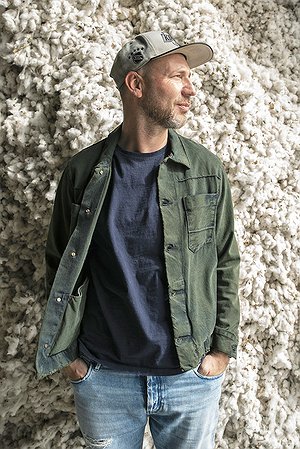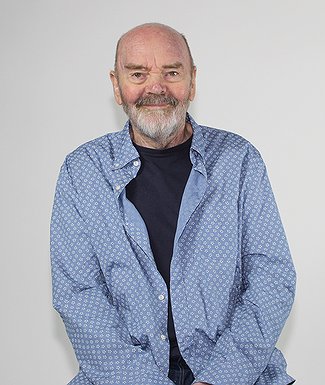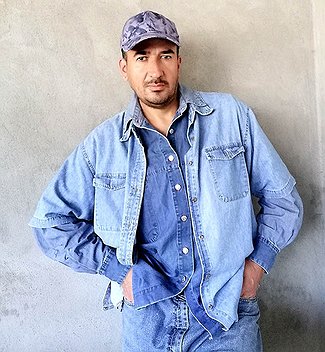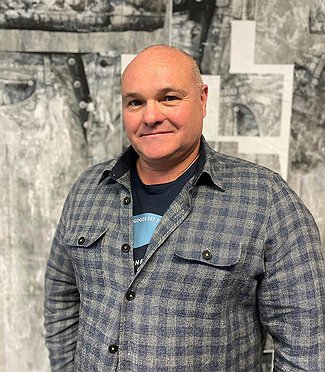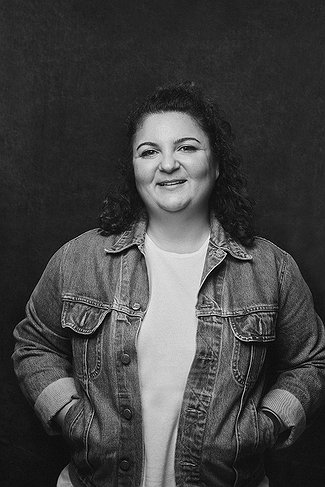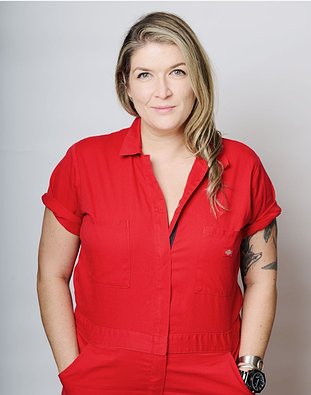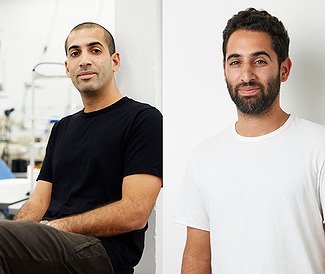INDUSTRY FOCUS: DENIM
New Blues: The Denim Industry Heads Into 2024
The denim industry enters 2024 with experts expressing optimism for innovation and implementation of solutions that will help alleviate the ecological, social and supply-chain challenges that have prevented this category from progressing. While hurdles remain, this year brings hope of positive change as denim leaders band together to implement groundbreaking advancements to support the circular economy through reuse, conservation of resources and cleaner technologies.
Denim in 2024 will also see unique approaches to development as creatives explore fresh designs, new applications, and updated textiles and notions. Tapping into the avant-garde and artistic sides of denim will set apart leaders from the rest of the pack.
California Apparel News asked denim innovators: As we begin 2024, what priorities in design, sourcing and/or manufacturing will determine the direction of the denim industry throughout the year?
Selen Baltaci
Marketing Manager
Calik Denim
At this critical point in the global climate crisis, we foresee that trends focused on sustainability and contributing to the positive transformation of the world will be at the forefront in our sector in 2024. Recycled materials, pioneering technologies in the use of water and chemicals, and trends that will ensure maximum compliance with the circular economy will be at the forefront. In this regard, we dominate the sector with our RE/J concept containing 100 percent pre- and post-consumer material, our Dyepro technology, and our unique biodegradable innovation B210.
On the other hand, in denim trends other than sustainability, lightweight, drapey and soft-touch fabrics and authentic looks; overdyes and dirty, tinty looks; fewer marble effects; and clean-look rinse washes come to the forefront. Also, our Rawtech products, which we support with our E-Last technology, stand out with stabilized weft-shrinkage values.
Massimo Callegari
North America Manager
ISKO
There are several key priorities that will shape the trajectory of the denim industry in terms of design, sourcing and manufacturing. First and foremost, sustainability is set to remain a paramount focus, influencing every facet of the industry, from material choices to manufacturing processes. The pursuit of sustainable practices and circular-economy principles will guide design innovation and sourcing strategies. At ISKO, we believe there will be a much greater emphasis on the use of recycled fibers and materials. Our Ctrl+Z material science ticks these boxes as these fabrics comprise only recycled and regenerated fibers, and it is now used across our entire new collection.
Furthermore, the emphasis on technology integration to support this is expected to grow, transforming the manufacturing landscape. For example, ISKO’s parent company, SANKO, has created a new business venture called Re&Up, which is a textile-to-textile recycling company to enable the fashion and textile industry to shift to circularity. It uses a seamless, closed-loop ecosystem for end-of-life textile waste, offering valuable recycled-textile raw materials for the whole industry at scale.
I firmly believe that these will be the main principles that will determine the direction of the denim industry for 2024 and beyond.
Alberto Candiani
President and Owner
Candiani Denim
We saw 2023 going through massive inventories accumulated the year before, and the overall average product now looks dated and, frankly, pretty boring. I believe 2024 will need a big refresh in terms of design.
Expect loads of novelty fabrics with coatings and special finishings. Comfort stretch, coarse yarns and heavy ring character in one direction, with more compact, 100 percent cotton constructions and flat looks in the other.
Washes and treatments will certainly play a big role in the redefinition of the aesthetics. Regenerative cotton has also impacted the sourcing, competing against organic as the new sustainable fiber story, and it may have a point.
Alberto de Conti
Head of Hub1922
Rudolf
From our perspective, three areas are likely to influence the sourcing and production of denim the most: supply-chain resilience, circular-economy initiatives and regulatory compliance.
Economic turmoil, high denim inventories and the long series of disruptions caused by the COVID-19 pandemic are constant reminders of the importance of resilient and flexible supply chains. All players along the denim and textile value chain need to evaluate and prioritize diversification tactics to improve supply-chain agility. Responsiveness instead of cost will be the new buzzword.
Adopting circular-economy principles, including recycling and upcycling, will become significantly more important. Companies have started to look for ways to reduce waste, use renewable energy as a raw material, increase the recyclability of textiles and promote a more sustainable life cycle for products.
Compliance with new, far-more-stringent environmental regulations, safety standards and other legal requirements will be critical for the denim industry. This applies in particular to entering or retaining European markets. To avoid disruption and reputational risk, it is of paramount importance for denim manufacturers to be aware of and adapt to regulatory changes.
Eda Dikmen
Marketing and Communications Manager
Soorty
Prioritizing sustainability in both sourcing and manufacturing will definitely be one priority. I expect a special emphasis on cotton and soil—such as using organic and responsible materials, fighting textile waste via repurposing and recycling, designing for longevity, transitioning to low-emission energy systems, minimizing water use, and implementing effective waste management.
Social responsibility will also be emphasized—where and how denim production can be a tool to impact communities positively will be explored, including fair wages, safe working conditions, and potentially creating green jobs. This is currently driving brands that we could not have possibly imagined being together collaborating and doing the most amazing things.
Another correlated point is the need for supply-chain resilience, which is imperative in the face of climate urgency, global economic and political instability, inflation, and ongoing pandemic effects. Building resilience involves strategic network design, diversifying suppliers across geographic locations and adapting to new working models, including hybrid and remote.
Digital transformation and innovative technologies will continue to guide our industry. The pandemic accelerated the adoption of digital platforms in fashion, and now almost every week we see a newness that creates engagement on a completely new level, leveraging e-commerce, social media and virtual showrooms for enhanced consumer connections and immersive experiences.
On the design and manufacturing side, innovations that require fewer sources for similar aesthetics and 3D modeling are becoming standard practices. I expect more development in that area, some possibly integrating AI and speed learning to streamline production and to potentially enhance product quality.
Anatt Finkler
Creative Director
Global Denim
As we chart a course toward enhanced practices and positive transformation, it is important to sustain the current trajectory. The focus must be on establishing new benchmarks while constantly aiming to exceed the sustainable targets set in the previous year.
The primary objective is the enhancement of denim quality, achieved through the incorporation of a higher percentage of recycled content, utilization of superior materials and techniques, fewer resources, the adherence to cleaner chemical processes, and an unwavering commitment to social and environmental standards across the entire supply chain.
Rather than centering efforts on cost reduction, strategic attention should be directed toward exploring new markets and the implementation of nearshoring initiatives as well as creating new products that can actually appeal to the mass market instead of just a niche.
Acknowledging the inherent evolution of design trends, priority should be given to minimizing waste during patternmaking and incorporating design thinking at the foundational level of production with an emphasis on designing for longevity.
Paolo Gnutti
Creative Director
ISKO Luxury by PG
In addition to the constant work in always creating new trends and new collections that can surprise, satisfy and anticipate the needs of final customers, it will be necessary to increasingly focus these efforts on dedicated customer services to consolidate the role of a partner with buyers and not just a fabric supplier.
In the upcoming years, the denim industry’s focus will increasingly shift toward producing sustainable, innovative and, above all, unique fabrics. ISKO is actively investing in this direction to cater to a customer base interested not just in sustainable products but specifically in sustainable fashion, a feat achieved uniquely by the PG collection.
Adriano Goldschmied
Founder and Designer
Genious Group
The beautiful thing about our business is that it keeps changing faster and faster in every area, from design to technical innovation. This has allowed the mission of “denim never dye” to continue for a long time.
The merging of design with technology is bringing us to new boundaries that were totally unexpected just a few years ago.
Design is not only about creativity but also about using digitalization and discovering the almost unknown possibilities of artificial intelligence. 2024 is probably a key year where we have amazing new tools that will allow us to do a better job, improving the quality and creativity of design, opening the way to more efficient and sustainable processes.
In the technical and sourcing area, we are in front of a strong acceleration in innovation that will bring better products with much lower impact in the industry.
The battle of the century is for sure substituting fossil-generated fibers with new fibers over nylon and poly. AeoniQ is taking the leadership in this segment, and it is very close to positive results.
The printing is at the early stages, but we can imagine that one day denim will be done in a completely different way than in the past. Recycling garments and fibers and waste is becoming more and more important in our industry, and we are passing from a primitive recycling to sophisticated processes to make stronger yarns.
These are just a few priorities—the race is open, and for sure we will run very fast.
Juan Carlos Gordillo
Denim Designer
The denim industry in 2024 will be shaped by several key priorities that will determine its course.
Adopting ethical and transparent practices will be crucial. Implementing sustainable materials like organic cotton and natural or recycled dyes alongside reducing water and energy consumption will be essential for a genuinely sustainable approach. Strategic partnerships and circular business models such as rental, exchange and resale will drive innovation and sustainability in the denim industry.
Integrating advanced technologies such as 3D printing and artificial intelligence will be pivotal in enhancing production efficiency. Furthermore, the use of lasers will significantly impact this sector.
The rising demand for personalized garments will drive the need to offer unique customer experiences. Providing tailored services and employing interactive technologies in online stores will make a difference in a competitive market.
Digitizing the supply chain to ensure product transparency and traceability will be a priority. Optimizing logistics will be fundamental in meeting ethical expectations from consumers.
Adaptation to cultural and consumption changes will also be a priority. The ability to adapt to shifts in consumer tastes, preferences and emerging trends will be critical in maintaining relevance in an ever-evolving market.
Philippe Mignot
Export manager
ACM
First of all, denim is set to live a true renaissance in that it gets elevated once more through the use of classical and clean fits, favoring soft washings and a more-uniform application of color.
Then, there are patchwork and trompe l’oeil designs made with the stitching of multiple elements, even contrasting or with digital prints. When it comes to printing techniques, one truly stands out, which is pigment printing, providing extremely high definition in terms of color. All of this, of course, will be happening under the umbrella of a vision increasingly geared toward sustainable production, making sure that responsible products are the only feasible option.
Sebla Önder
Sustainability Chief
ORTA
Longevity, circularity and a regenerative mindset will continue to be at the heart of denim. Circularity is expected to be at the core of our decisions, especially on design and sourcing. Recycled and recyclable materials with proven traceability and human and environmental safety have been the challenge lately. We expect to receive more demand on this challenge and hope to see more solutions in action.
In terms of virgin materials, regenerative cotton entered the market with great excitement and will be more popular in 2024.
Lastly, in terms of logistics and sourcing, we expect more of a shift to Turkey and Europe in production and sourcing.
Ebru Ozaydin
Global Strategic Marketing Director, Denim, Wovens, Ready-to-Wear
The LYCRA Company
Obviously all three are closely linked since they define a circular —no longer linear—algorithm from ideation to production. Now, overconsumption and overproduction are significant concerns.
With all that we have experienced over the last three years, from supply-chain complexities to unpredictable consumer purchasing behavior, a mandatory reverse-thinking pattern became apparent.
The necessity of reconsidering value has ignited the questioning process of optimization and is supported by legislative actions, which are spearheaded mostly by European countries. I believe the top three words we will hear more in 2024 are: resilience, accountability and flexibility.
The sluggish demand, specifically in denim, will put pressure on designers and makers to be more creative with solutions and innovative with products but this time with more responsibility in mind such as being selective of raw materials, clean processing and, most importantly, ethical concerns.
Nearshoring or friendshoring are not new to us as global trade relations grow more tense. This contributes to building up value or bringing agility to supply-chain patterns in this era of unpredictable consumer sentiment and behavior and mitigates the risk of currency-related losses.
Carlo Parisatto
CMO, Commercial Director
Cadica
Although enormous strides have been made in our industry toward more-ethical and sustainable production through the use of new technologies and major innovations that offer a wide range of new opportunities, major new challenges for the fashion industry are opening up for 2024.
Brands will increasingly have to adapt to new consumer demands. They will increasingly have to take advantage of new technologies to produce more and more ethically and sustainably, especially by verifying and demanding from the production chain transparency and responsibility toward the environment and social issues.
This is increasingly the vision that we promote at Cadica—creating beautiful, unique, innovative collections that are created based on the needs and demands of our customers but produced with ethical and verifiable processes.
Alongside our customers we encapsulate our service in one word: eco-innovation.
Holly Sanders
Founder
The Angela
Customization in design is going to be prioritized, and it’s going to force companies to be lean and close the distance in manufacturing. Customers want control and pieces that are more exclusive; having expressive, inclusive design options and giving customers choices will be the new wave.
Footwear has done a great job with these offerings over the years, but clothing has been slow to adapt. It’s always been a priority to me: My customers tell me what they want and I make it, but I look forward to seeing this scaled at larger companies and the impact it’ll have on North American manufacturing and denim expression.
Kutay Saritosun
Director of Brand Services and Partnerships
Bluesign
As we embark on 2024, the prevailing priorities that will steer the course of the denim industry throughout the year will center on a resolute commitment to sustainability in design, sourcing and manufacturing. A frontrunner in this transformative movement is bluesign DENIM, an exemplary concept merging style with responsibility.
The core of responsible denim involves addressing environmental concerns associated with traditional production methods. By embracing the bluesign SYSTEM, denim evolves from being a mere garment into a potent statement of environmental consciousness, catalyzing positive change within the industry.
bluesign DENIM focuses on cleaner production, necessitating both denim mills and laundries to be bluesign SYSTEM partner companies such as ISKO, Prosperity, Advance Denim and Saitex Vietnam, implementing stringent environmental and worker-safety criteria. Moreover, it champions cleaner chemistry by adhering to the highest standards, requiring the use of only bluesign APPROVED chemical products in both fabric manufacturing and laundry processes to mitigate the negative impact on people and the planet.
In 2024, investing in a better tomorrow involves brands offering their shoppers the perfect blend of style, comfort and sustainability with bluesign DENIM, charting a course where the industry narrative undergoes a transformative redefinition.
Katie Tague
Vice President of Denim Marketing and Sales
Artistic Milliners PVT LTD
As we move into 2024, the denim industry seems increasingly pivoted toward co-collaborative design with manufacturers levering 3D technology. Additionally, the industry continues to show a keen interest in nearshoring solutions for speed-to-market responsiveness. And amid the continual shifts in the supply-chain landscape, sourcing in innovative fibers emerges as a paramount focus for industry stakeholders.
Eylem Temizkan
Board Member
BlueMatters
As we embark on the journey into 2024, the denim industry finds itself at a crucial juncture, where strategic priorities in eco design, sourcing and manufacturing will undeniably shape its trajectory this coming year. Eco design stands as a linchpin for success, with a focus on sustainability and circular fashion taking center stage. Furthermore, the denim industry is set to witness a surge in customization and personalization, allowing consumers to play an active role in the eco-design process.
Sourcing strategies, too, will play a pivotal role as the industry strives for transparency and ethical practices. The demand for traceable and responsibly sourced raw materials is on the rise, prompting brands to forge partnerships with suppliers who adhere to stringent ethical and environmental standards. However, a pressing issue that demands attention is the prevailing challenge of low pricing, which often compromises the fair compensation of labor and ethical production practices. The importance of a balanced and valuable cooperation between brands and suppliers cannot be overstated in this context.
In the realm of manufacturing, the emphasis on technology integration and automation will redefine efficiency and precision. Smart manufacturing processes not only streamline production but also contribute to reducing waste and optimizing resources.
The denim industry’s compass for 2024 points toward a future where eco-design creativity intertwines with sustainable practices, ethical sourcing becomes non-negotiable and manufacturing undergoes a digital transformation to meet the evolving demands of conscious consumers, all while addressing the imperative of fair rates for the entire supply chain.
Alice Tonello
Marketing Research and Development
Tonello
In 2024, I think the direction of the denim industry rests on two key focal points: prioritizing consumer involvement in the purchasing process and meeting the challenge of creating value-rich products that align with diverse standards while respecting ethical and environmental aspects.
The industry’s opportunity lies in engaging consumers more actively, potentially through upcycling, customization or on-demand production. This strategy not only follows individual preferences but also minimizes waste by producing exactly what customers desire, when they need it, and also by giving new life to something old or unsold. This consumer-centric approach aligns satisfaction with reduced environmental impact, potentially reshaping the denim market’s direction.
However, a notable challenge emerges in crafting denim products that hold genuine value. The focus here isn’t only based on aesthetics but also on respecting different aspects: human rights, the environment and diverse beauty standards. The emphasis is on cultivating an engaged and mindful consumer purchasing process that extends beyond superficial aspects.
Navigating 2024 won’t be an easy journey for the global denim market, presenting several challenges. However, I think it will surprise us with innovative, new and perhaps, so far, unconsidered content.
Aydan Tüzün
Executive Director of Sales and Marketing
Naveena Group
Foremost among these priorities is an unwavering commitment to sustainability. The industry is placing a heightened focus on sustainable fibers, responsible sourcing practices and eco-friendly manufacturing methods. This sustainability-driven approach is expected to play a pivotal role in defining the industry’s direction.
Moreover, customization and innovation in denim design will be key considerations throughout the year. Brands that embrace unique styles, offer personalized options and integrate technological innovations into their manufacturing processes are likely to stand out in a competitive market.
Additionally, the industry will remain attuned to evolving fashion trends and consumer preferences. Sensitivity to shifts in design aesthetics and the ability to cater to the ever-changing tastes of consumers will continue to be crucial factors in determining success.
Furthermore, nearshoring applications are anticipated to gain prominence in 2024. This strategic approach is expected to enhance supply-chain efficiency, reduce lead times and contribute to a more sustainable industry by minimizing transportation-related environmental impacts.
In summary, the denim industry in 2024 will be characterized by a steadfast commitment to sustainability, a focus on innovative design, responsiveness to consumer preferences and the growing prominence of nearshoring applications. These priorities collectively will guide the industry’s direction throughout the year.
Adam and Liran Vanunu
Co-founders
Cotton Citizen
Looking ahead to 2024 and continuing to expand Cotton Citizen’s denim program, our emphasis will remain on relaxed, versatile silhouettes in a range of sophisticated, heritage-inspired treatments—our brand’s reimagining of classic blue jeans for a contemporary collection of essentials.
2023 saw the expansion of our denim silhouettes to include a range of low- and high-rise silhouettes, baggy and tailored, as well as the introduction of unisex offerings. Building on this foundation inspired by the heritage denim our dye house has produced for decades, we will continue to innovate our manufacturing practices and produce our products with the highest standards and highest-quality materials made by American manufacturers.
Andrea Venier
Managing Director
Officina39
From our privileged position in close contact with brands and therefore with the end customer in the supply chain, we can say that the market increasingly demands sustainable processes and products with a focus on the cost of the recipe. This is why we can say that the direction is toward sustainability but with an innovative thrust that takes into account optimizing materials but also economic resources.
Sometimes it is a matter of improving what already exists; other times it is necessary to rethink processes and products from scratch. The focus is on supply-chain interconnection, with the aim of being all aligned and proposing appropriate solutions to the end customer.
We strongly believe in collaborations between companies. We think that this type of synergy allows us to obtain better and more appropriate results for the market, precisely because by comparing different points of view from different parts of the supply chain we can have a broader vision not only of the processes but also of the real needs of each customer and the market in general.
Matteo Vivolo
Chief Sales Officer
Vivolo
Customization is something we believe will take the denim industry by storm in the coming year, with brands focusing on new, alternative and innovative ways to make a garment just that extra bit unique, the backside label being a case in point, a useful gateway as well as added value that allows brands to stand out along with their garments. Brands like to play with details and will be doing so increasingly, experimenting with a wide range of solutions, which can include embroidery, applications, color use, reliefs, metal customizations and so much more.
As far as materials go, suede and printed leather will be 2024’s top requests. We expect a consumer-centric vision of denim through which consumers can express tastes and identities by customizing every aspect—from fabric details to accessories—according to their own unique vision.
This will inevitably bring the consumer back to the center of in-store shopping to get that bespoke experience where choosing the right denim for them, from the fabric to the details, equates to expressing one’s identity. The first-person-choice process will also and above all result in even greater awareness regarding the use of environmentally sustainable materials and the enhancement of the most virtuous supply chains.
Vivian Wang
Managing Director anf Global Sales Manager
Kingpins Show
The denim industry is laser focused on sustainability and circularity as companies pursue the United Nations Sustainable Development Goals.
At Kingpins, we want to help our exhibitors and attendees meet these SDGs, just as we aim to inform the entire industry about the latest best-business practices. That means sustainable and renewable materials as well as recycled products, reuse and upcycling.
Our One Denim initiative showcases the variety of looks that can be achieved using just one base fabric, and our Most Sustainable Product initiative highlights responsible products and practices. We put creatives and manufacturers together to push the boundaries of what can be done with denim for The Boxes, our installation project for inspiration, education and trends.
Our exhibitors are launching new developments like Cooltrans, an indigo alternative launched by Prosperity Textile’s Stella Blu division, that uses no heat and 90 percent less water than conventional dye methods.
Other burgeoning issues are 3D design and artificial intelligence. Many are using 3D design to reduce the number of physical samples produced. The Soorty denim mill has been rolling out AI-generated denim collections and collaborations. Material Exchange recently launched an AI tool to help companies source smarter. And at our Amsterdam show in October and our pop-up event in Hong Kong in November, Material Exchange’s Darren Glenister was part of a talk called “AI Is Set to Revolutionize the Denim Industry—and the Transformation Has Already Begun!”
These will be among the top-priority issues for the denim community in 2024 and beyond.
Amy Williams
CEO
Citizens of Humanity Group
The transition to regenerative agriculture and regeneratively grown cotton is where we now understand we can make the biggest impact on the health of our planet and people. We’ve expanded our Regenerative Cotton Program to 13 farms across the U.S. and Turkey, which are currently in a promising second harvest.
Our commitment extends beyond improving soil health and reducing the use of harmful pesticides; it’s also about revitalizing entire ecosystems and communities. The benefits are multifaceted, from sequestering carbon and enriching the nutritional profile of the land to bolstering the economic stability of farmers and surrounding communities.
Recognizing the magnitude of this challenge, we believe that collaboration with other brands of all types and sizes will deliver the best ultimate solutions and outcome. We are not competing for customer attention in this work; we are looking to create a synergy that amplifies our impact, driving substantial and lasting change.
Responses have been edited for clarity and space.



